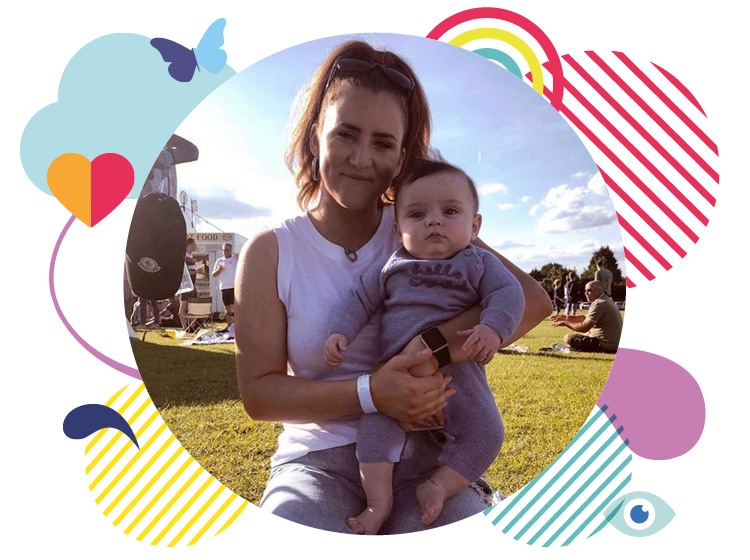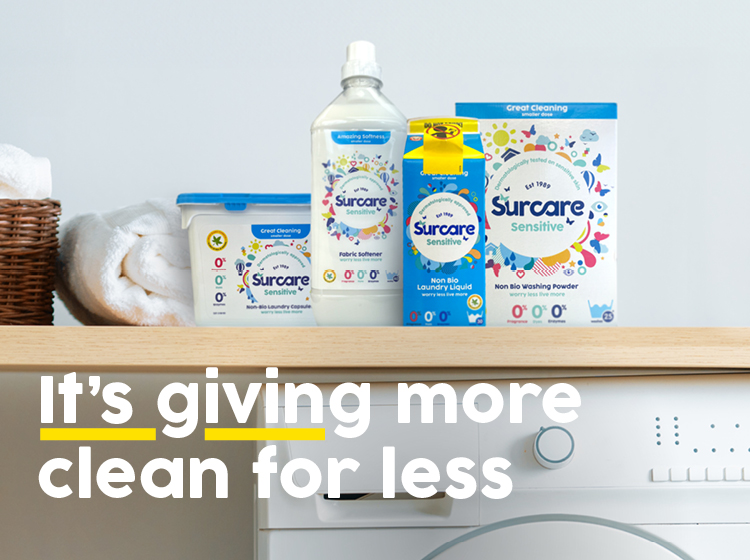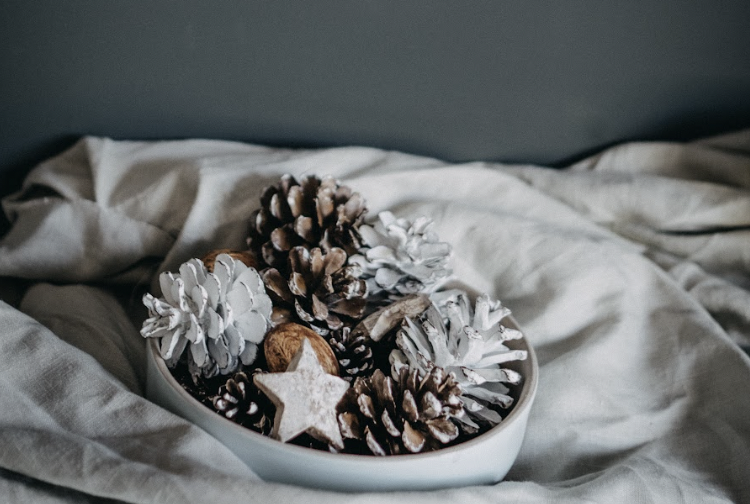Better known as ‘The Folding Lady’, you’re likely to have seen Sophie on your Instagram or TikTok feed, showcasing her latest storage hack or folding technique. However, what you may not know is that the mother of two has had to become a master in the field of food allergies and eczema after her youngest son Arthur started showing signs as a newborn.
What sensitive skin issues have you suffered with in the past?
I have had psoriasis since I was around 20 years old, but I’ve never been able to identify my trigger. The way it presents itself has changed over the years and has affected all parts of my body at different times, at one point covering me entirely. I particularly suffer on my scalp which is frustrating as I find I am constantly itching. If I don’t wash my hair regularly the flakes can be really upsetting. The flare ups come and go, it’s just something I’ve learnt to live with over the years.
When did you start to notice sensitivities with your children?
My youngest son Arthur, who is now two, has eczema which is triggered by food. He has an intolerance to wheat and he also has an allergy to milk.
The milk allergy was diagnosed very early at his six-week check as he was so unsettled, and his nappies were still newborn like. He wasn’t feeding well; his hunger would make him want to feed but then feeling uncomfortable would make him want to stop.
The GP suggested it could be a dairy intolerance but instructed me not to change to a prescription dairy-free formula. My maternal instinct wasn’t comfortable with that advice, so I went home and researched, immersing myself in the subject. I read forums, other people’s personal stories and knew that a dairy intolerance was what Arthur was experiencing. After advice from my mum, who’s a healthcare professional, I got the confidence to go back to the GP and push for the dairy free formula. Once we received it, we had a different baby in two weeks.
My maternal instinct was right, and I always tell people how important it is to listen to that little voice. You have to fight for what you want.
When did you start to notice your son’s wheat allergy?
When we started weaning at around six months, we started to notice the onset of rashes and itching. It was summertime so we thought it could be hay fever, but after going back to the food sources I realised what it was that was causing the symptoms. Soon after we removed wheat from his diet, and the symptoms disappeared. His skin looked clear and healthy.
Looking back, I remember one time vividly; we had taken Arthur to a lovely local bakery where they make everything on site from scratch. He was fine before and although he didn’t eat anything, just the wheat in the air was enough to set him off with a streaming nose and eyes.
How do you manage Arthur’s triggers and flares?
We kept him on a strict dairy and wheat free diet until after his weaning stage, which in all honesty, was really tough. I did more cooking than I had ever done before in my life!
Now he’s older we choose to allow some wheat in his diet where we can’t completely control his food intake. Yes, he gets a little eczema, but we can manage it by keeping his skin moisturised at all times. Protecting the skin barrier has made a huge difference for us and is part of our everyday routine.
What impact did the eczema have on Arthur and the rest of family?
As a mother watching your baby itch their delicate skin is really difficult and upsetting to watch. Arthur is a good sleeper but itching during the night resulted in unsettled sleep, leaving him tired during the day. It got to the point where he would constantly itch as he slept, making himself bleed, which is why that bedtime moisturiser routine is so important.
Where did you go for advice? Any recommendations
I did a lot of my own research, mostly online. What I learnt is that eczema and allergies are so different for everyone – all children, bodies and tolerance levels are different.
Luckily for me, my mum, auntie and gran are all medical professionals, so I have benefitted from their informed opinion. They have given me the confidence to question things and to take action on my gut instincts.
Those living with a dairy allergy in the household will no doubt have heard of the “Milk Ladder”, created to gradually increase a child’s exposure to milk by completing each step to build up their tolerance gradually. It is positioned as a route out but as of yet it hasn’t work for us, so if anyone is reading this and is still on step one, know you’re not alone! I’m also aware that whilst it’s yet to work for Arthur, most children will grow out of dairy intolerances by the time they are five years old.
What lifestyle changes have you had to make?
We adopted a test and learn approach in our house. Both my husband and I have had to learn how to cook and we check packets and ingredients religiously. Dairy free life isn’t as bad as it sounds, we do all enjoy a takeaway, Arthur’s favourite is a Chinese which is of course mostly dairy free.
Wheat free life is so much harder, it takes over your life. Because wheat is so much more prevalent, especially in quick snacks and more social foods. When dining out dairy is taken seriously as an allergy whereas wheat/gluten can be seen more as a lifestyle choice so is harder to avoid.
Nowadays we do let Arthur taste and monitor the reaction. If he’s having a bad flare up then we go back to basics and get his skin back to best form, before testing again. Being able to have occasional little bites without impact makes me believe he is improving.
Do you think skin conditions like eczema and psoriasis are spoken about enough?
I think skin conditions are spoken about, but they are spoken about too broadly. For example, I didn’t know eczema could be triggered by food, I thought it was a result from contact. My experience as an “allergy mum” has taught me the power of food and that food is medicine. I am so grateful to have learnt about how to nourish my child to help him be the most well he possibly can be.
Reflecting back what advice would you give to yourself, or another mum, who has just discovered their baby has sensitive skin/eczema?
Go with your gut – it doesn’t matter if you are first time mum or not, I really believe women have a powerful instinct when it comes to our babies. Don’t miss your health checks and if you’re concerned make an appointment – make it happen!
Remember you are your child’s advocate. Ask all the questions and look to speak to specialists, they made us feel supported and positive.
Educate yourself – in my experience you have to do it yourself, if your baby has an allergy you will have to do the work to understand the triggers and how to manage it. No one will know Arthur’s condition like me and Arthur.
Do you have an approach or resources you would recommend to others?
You have to make up your own strategy and rules and figure it out for yourself. The GP can advise and suggest but can’t tell you what will work for you. The quickest way to do it is to diarise, monitor and cut out food groups and see the impact.
I surrounded myself with education and information, I watched documentaries and listened to hours of podcasts, including “Food for Thought” with Rhiannon Lambert and “The Food Medic” with Dr Hazel Wallace. I would also recommend “The Blue Zones” by Dan Buettner.
What are your hopes for Arthur?
Of course it would be great for him to have the freedom to eat dairy in the future, but if he doesn’t that’s okay. I know how lovely it is to be able to eat a cake or something from Cadbury’s, but ultimately, he has a fantastically healthy diet and as a family we all have better diets too as a result.
You can find and follow Sophie @thefoldinglady on Instagram and TikTok.
Thank you to Sophie for sharing her and her family’s personal journey about eczema in babies and young children. This is a personal account which we hope is helpful and reassuring. If you have a medical query you should always consult your GP in the first instance.












































